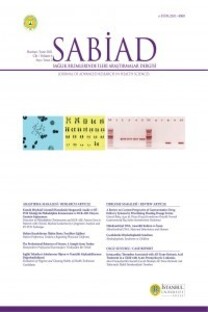EFFECT OF THYMOQUINONE IN COMBINATION WITH NIVOLUMAB ON EXPERIMENTAL RENAL CELL CANCER MODELS
Objectives: Thymoquinone a bioactive component extracted from the seeds of Nigella sativa, has been proved to have antiinflammatory, antioxidant properties anti antitumor efficiency against breast, prostate, bladder, and renal cell cancer. We aimed to investigate the synergistic cytotoxic and apoptotic effects of thymoquinone in combination with nivolumab, an immuno-control inhibitor, and its mechanism in renal cell cancer models. Materials and Methods: In vitro studies: Caki-1 and Renca renal cancer cell lines with mononuclear cells were cocultured and thymoquinone and nivolumab effect were analyzed by MTT and Annexin V + PI. In vivo studies: Renal cell cancer model was provided by subcutaneous injection of RENCA cells to C57BL/6, male, 8 weeks old mice in four groups. Control group, thymoquinone (1,4,7,14days,20mg/kgIP), nivolumab administered (1,6,13days10mg/ kgIP), thymoquinone and nivolumab. Seven animals was randomized in each experimental group. Apoptosis, necrosis, CD4,CD8,C20,CD34,CD31,VEGF-A by immunohistochemistry, FGFR-1,PDGFRbeta,VEGFR-2,c-kit,RET,c-Met,AXL,Flt-3,TIE2, ICAM-1,VCAM-1 and E-selectin mRNA levels by quantitative real-time- PCR were evaluated on tumor tissue. Liver, kidney, brain, lung and heart tissues was evaluated for side effects. Plasma biochemistry tests were performed. Statistical analysis was be performed with Mann-Whitney U test with p <0.05 value. Results: Thymoquinone showed antitumor effect in vitro and in vivo. It also showed increase in immune cell death of nivolumab. Tumor tissue showed prominent necrosis or complete response to therapy in combination group. Conclusions: We conclude that thymoquinone has antitumor effect on renal cell carcinoma and increases the effect of nivolumab immune, cell death effects. Besides, it does not have side effect on other organs whether alone or in combination.
EFFECT OF THYMOQUINONE IN COMBINATION WITH NIVOLUMAB ON EXPERIMENTAL RENAL CELL CANCER MODELS
Objectives: Thymoquinone a bioactive component extracted from the seeds of Nigella sativa, has been proved to have antiinflammatory, antioxidant properties anti antitumor efficiency against breast, prostate, bladder, and renal cell cancer. We aimed to investigate the synergistic cytotoxic and apoptotic effects of thymoquinone in combination with nivolumab, an immuno-control inhibitor, and its mechanism in renal cell cancer models. Materials and Methods: In vitro studies: Caki-1 and Renca renal cancer cell lines with mononuclear cells were cocultured and thymoquinone and nivolumab effect were analyzed by MTT and Annexin V + PI. In vivo studies: Renal cell cancer model was provided by subcutaneous injection of RENCA cells to C57BL/6, male, 8 weeks old mice in four groups. Control group, thymoquinone (1,4,7,14days,20mg/kgIP), nivolumab administered (1,6,13days10mg/ kgIP), thymoquinone and nivolumab. Seven animals was randomized in each experimental group. Apoptosis, necrosis, CD4,CD8,C20,CD34,CD31,VEGF-A by immunohistochemistry, FGFR-1,PDGFRbeta,VEGFR-2,c-kit,RET,c-Met,AXL,Flt-3,TIE2, ICAM-1,VCAM-1 and E-selectin mRNA levels by quantitative real-time- PCR were evaluated on tumor tissue. Liver, kidney, brain, lung and heart tissues was evaluated for side effects. Plasma biochemistry tests were performed. Statistical analysis was be performed with Mann-Whitney U test with p <0.05 value. Results: Thymoquinone showed antitumor effect in vitro and in vivo. It also showed increase in immune cell death of nivolumab. Tumor tissue showed prominent necrosis or complete response to therapy in combination group. Conclusions: We conclude that thymoquinone has antitumor effect on renal cell carcinoma and increases the effect of nivolumab immune, cell death effects. Besides, it does not have side effect on other organs whether alone or in combination.
___
- Curtius K, Wright NA, Graham TA. Evolution of Premalignant Disease. Cold Spring Harb Perspect Med. 2017;7(12)
